 W
WAndrija Artuković was a Croatian lawyer, politician, and senior member of the ultranationalist and fascist Ustasha movement, who served as the Minister of Internal Affairs and Minister of Justice in the Government of the Independent State of Croatia (NDH) during World War II in Yugoslavia. He signed into law a number of racial laws against Serbs, Jews, and Roma, and was responsible for a string of concentration camps in which over 100,000 civilians were tortured and murdered. He escaped to the United States after the war, where he lived until extradited to Yugoslavia in 1986. He was tried and found guilty of a number of mass killings in the NDH, and was sentenced to death, but the sentence was not carried out due to his age and health. He died in custody in 1988.
 W
WIvan Babić was a Croatian soldier and lieutenant-colonel in the Croatian Home Guard and later an emigrant dissident writer against Communist Yugoslavia.
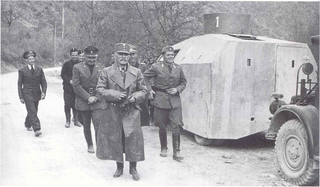 W
WVilko Begić was a Croatian military officer.
 W
WZdenko Blažeković was a Croatian fascist official who held several posts in the World War II Ustaše regime in the Independent State of Croatia (NDH). He was the student commissar at the Ustaše University Centre (USS), leader of the male Ustaše Youth organisation and a sports commissioner in the NDH.
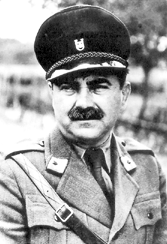 W
WMile Budak was a Croatian politician and writer best known as one of the chief ideologists of the Croatian fascist Ustaša movement, which ruled the Independent State of Croatia during World War II in Yugoslavia from 1941–45 and waged a genocidal campaign of extermination against its Roma and Jewish population, and of extermination, expulsion and religious conversion against its Serb population.
 W
WMatija Čanić was Croatian military officer who became a general during the Independent State of Croatia and was awarded the title of knight (vitez). He was a supporter of Lorković-Vokić coup, but suffered no serious consequences.
 W
WThe Croatian Home Guard was the land army part of the armed forces of the Independent State of Croatia which existed during World War II.
 W
WKrunoslav Stjepan Draganović was a Bosnian Croat Roman Catholic priest associated with the ratlines which aided the escape of Ustaše war criminals from Europe after World War II while he was living and working at the College of St. Jerome in Rome. He was an Ustaša and a functionary in the fascist puppet state called the Independent State of Croatia.
 W
WGeorg Dragičević was a Croatian soldier who was a member of the army of Austria-Hungary, Royal Yugoslavia, and the Independent State of Croatia.
 W
WFranjo Džal was a colonel in the Independent State of Croatia's air force.
 W
WJure Francetić was a Croatian Ustaša Commissioner for the Bosnia and Herzegovina regions of the Independent State of Croatia (NDH) during World War II, and commander of the 1st Ustaše Regiment of the Ustaše Militia, later known as the Black Legion. In both roles he was responsible for the massacre of Bosnian Serbs and Jews. A member of Ante Pavelić's inner circle, he was considered by many Ustaše as a possible successor to Pavelić as Poglavnik (leader) of the NDH. He died of wounds inflicted when he was captured by Partisans near Slunj in the Kordun region when his aircraft crash-landed there in late December 1942.
 W
WCvitan Galić was a Croatian World War II fighter ace.
 W
WRadoslav Glavaš was a Herzegovinian Franciscan who headed the Department of Religion of the Ministry of Justice and Religion of the fascist Independent State of Croatia during the World War II.
 W
WIvan "Ivo" Herenčić was a general in the armed forces of the fascist puppet state, the Independent State of Croatia, who commanded a battalion of Ustasha Militia that committed many war crimes and atrocities on civilians in the NDH. Born in Bjelovar in Austria-Hungary, he completed secondary and tertiary education in Zagreb and Sarajevo in what was by then the Kingdom of Yugoslavia. In 1933, he left Yugoslavia to join the fascist and ultranationalist Croatian Ustasha movement in Italy. Late that year, Herenčić participated in an unsuccessful assassination attempt on the King of Yugoslavia, Alexander.
 W
WĐuro Jakčin was a Croatian naval officer and first commander of Navy of the Independent State of Croatia.
 W
WBožidar Kavran (1913–1948) was a member of the Croatian World War II Ustaše regime
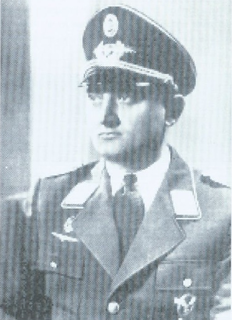 W
WVladimir Kren was a Croatian major general and commander of the Air Force of the Independent State of Croatia (ZNDH) during World War II. He was an officer in the Royal Yugoslav Air Force (VVKJ) before the war. In April 1941, he defected to Nazi Germany and handed over the locations of many of the VVKJ's dispersal airfields and exposed many of its codes. This made it easier for the Luftwaffe to destroy the VVKJ during the Axis invasion of Yugoslavia, which began shortly after Kren's defection.
 W
WDr. Džafer Kulenović, often referred to as Džafer-beg Kulenović, was a Yugoslav politician who led the Yugoslav Muslim Organization in the Kingdom of Yugoslavia, and was briefly Minister of Forestry and Mining in the pre-war Yugoslav governments of Dragiša Cvetković and Dušan Simović. During World War II, he served as the Vice President of the Axis puppet state the Independent State of Croatia.
 W
WEugen Dido Kvaternik was a Croatian Ustaše General-Lieutenant and the Chief of the Internal Security Service in the Independent State of Croatia, a Nazi puppet state during World War II.
 W
WSlavko Kvaternik was an Croatian Ustaše military general and politician who was one of the founders of the Ustaša movement. Kvaternik was military commander and Minister of Domobranstvo. On 10 April 1941, he declared the creation of the Independent State of Croatia.
 W
WVladimir Laxa was a Croatian general who served in the Austro-Hungarian Army during World War I and in the Croatian Home Guard during World War II. During World War II, he was Army Chief of Staff of the Axis puppet state, the Independent State of Croatia, from June 1941 until August 1942, when he resigned his commission purportedly in protest of the atrocities committed by the Ustaše Militia.
 W
WMladen Lorković was a Croatian politician and lawyer who became a senior member of the Ustaše and served as the Foreign Minister and Minister of Interior of the Independent State of Croatia (NDH) during World War II. Lorković led the Lorković-Vokić plot, an attempt to establish a coalition government between the Ustaše and the Croatian Peasant Party and align the Independent State of Croatia with the Allies.
 W
WVjekoslav Luburić was a Croatian Ustaše official who headed the system of concentration camps in the Independent State of Croatia (NDH) during much of World War II. Luburić also personally oversaw and spearheaded the contemporaneous genocides of Serbs, Jews and Roma in the NDH.
 W
WMihajlo Lukić was a Croatian general who began his career as an officer in the Austro-Hungarian Army during World War I, then climbed the hierarchy of the Royal Yugoslav Army, finally joining the Croatian Home Guard during World War II. He was retired in 1943 due to his disapproval of sending Croat volunteers to the Wehrmacht. After the collapse of the Independent State of Croatia, communist authorities sentenced him to 10 years in prison.
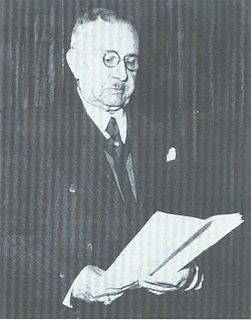 W
WNikola Mandić was a Croatian politician who served as a Prime Minister of the Independent State of Croatia (NDH) during World War II. He was executed by the Yugoslav Partisans as a war criminal on 7 June 1945.
 W
WVinko Nikolić was a Croatian writer, poet and journalist, and a high-ranking official in the fascist Independent State of Croatia (NDH). After the downfall of NDH, he emigrated to Buenos Aires, Argentina, where he lived in exile until returning to Croatia, several years before his death.
 W
WAnte Pavelić was a Croatian politician and dictator who founded and headed the fascist ultranationalist organization known as the Ustaše in 1929 and governed the Independent State of Croatia, a fascist puppet state built out of parts of occupied Yugoslavia by the authorities of Nazi Germany and Fascist Italy, from 1941 to 1945. Pavelić and the Ustaše persecuted many racial minorities and political opponents in the NDH during the war, including Serbs, Jews, Romani, and anti-fascists, becoming one of the key figures of the Genocide of Serbs and the Holocaust in NDH.
 W
WTomislav Sertić was a Croatian military officer who served as the Commander of all Ustaše Military Units, Chief of Staff of the Ustaše Militia and the Chief of the General Staff of the Armed Forces. He was captured at the end of World War II and put to death as a war criminal.
 W
WFranjo Šimić was a Croatian colonel, and later general, in the Croatian Home Guard. Prior to World War II he served as Maria of Yugoslavia's adjutant.
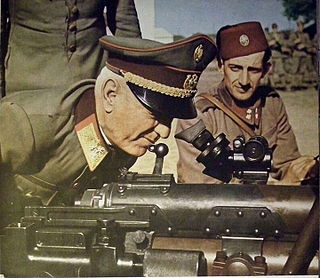 W
WSlavko Štancer was a Croatia commander-in-chief and inspector-general of the land component of the Domobranstvo in 1941, the army of the Independent State of Croatia during the Second World War. His surname is also sometimes written "Stanzer" or "Stancer".
 W
WAnte Vokić was a Croatian politician, general and putschist. Member of the Ustaše, he was the Minister of Armed Forces of the Independent State of Croatia from 29 January to 30 August 1944, succeeding Miroslav Navratil.
 W
WVjekoslav Vrančić was a high-ranked Croatian Ustaše official who held different positions in the Independent State of Croatia during World War II in Yugoslavia. After the proclamation, he served as the Under Secretary of the Ustaše Foreign Affairs Ministry. In 1942, he was Pavelić's envoy to the Italian Second Army. In this role he entered into negotiations with Chetnik representatives Jevđeviċ, Grđiċ and Kraljeviċ. Then he served as Under Secretary in the Ustaše Interior Ministry, the "body directly responsible for concentration camps and repressive political apparatus". Vrančić was "decorated by Hitler in honor of his planning skills at the work of mass deportation".